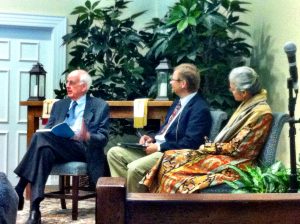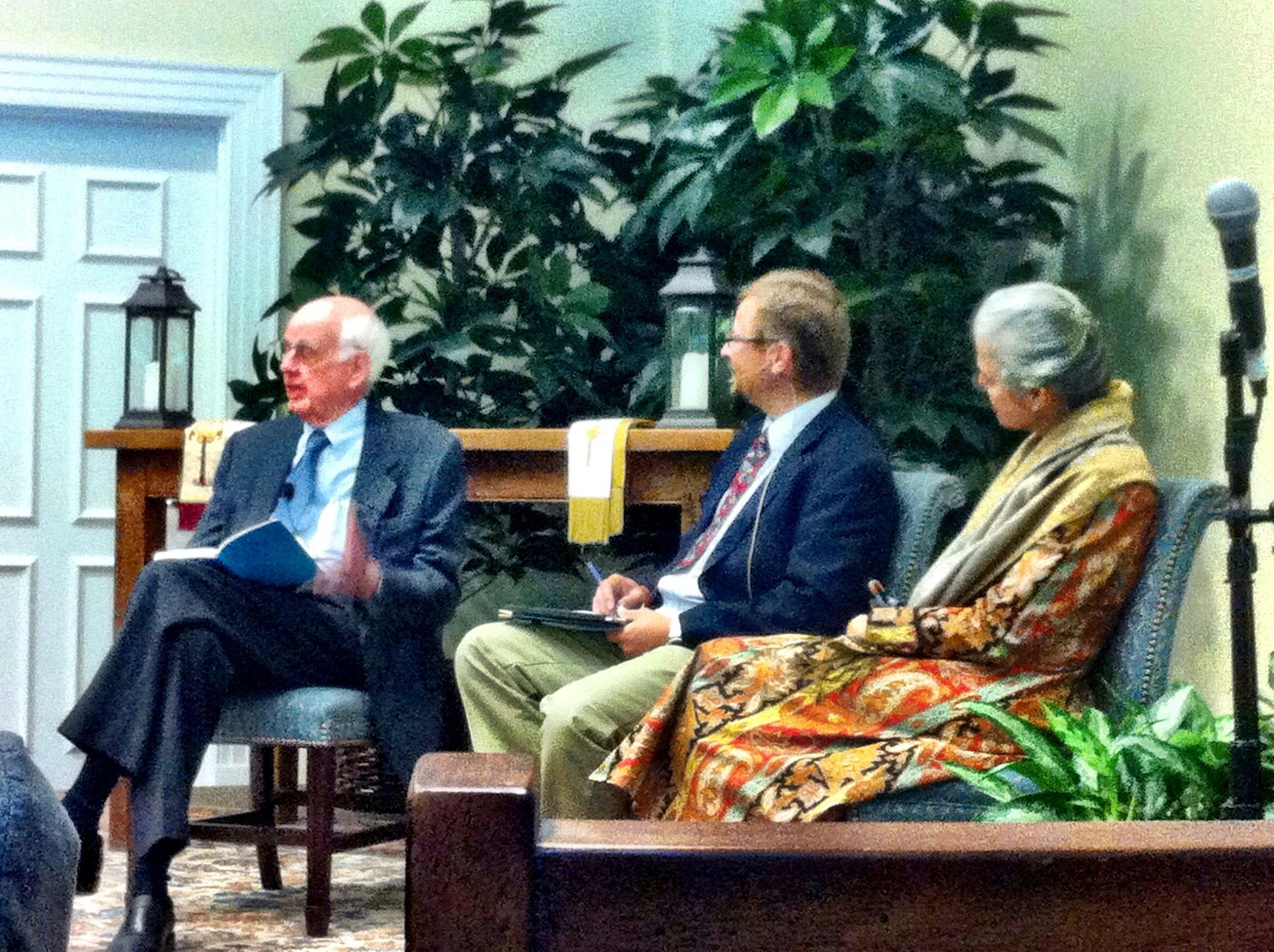Practicing Resurrection F ~ Food and Faith
Saturday morning I was up early with plans to go to a hot yoga class. My husband was planning to catch a swarm of bees (a story for another post). He told me that his friend and fellow bee-keeper couldn’t go with him… because Matt was going to hear Wendell Berry speak.
Wait. What!? Where?
I didn’t even change my clothes. I just found the event details online (free and open to the public, seriously?!). Then I grabbed my journal and headed over to St. George’s Episcopal Church. The topic for the conversation was “Food & Faith: A Matter of Health and Wholeness.”
conversation was “Food & Faith: A Matter of Health and Wholeness.”
The morning began with a presentation by Duke theologian and ecologist, Norman Wirzba. He offered a theology and ecology of food and faith. He said eating is an “act of intimacy” that reflects our relationship to the whole world. Bees, water, weather, farmers, butterflies, policies, economies and the earth itself are in every bite. The best response for our part as eaters is to observe a silence before we take the world into our bodies. He noted that God loves soil. God loves material bodies and creates the world with a hope of joining in it. “Food,” says Wirzba, “is God’s love and delight made delectable.” More nuggets of his presentation can be found here.
God Who Engages
After a break Duke biblical scholar, Ellen Davis spoke briefly giving us several “biblical sidebars” (formerly known as footnotes). Genesis chapter one says human beings are created in the image of God, but at that point, all we know is that “God is an appreciator of that which is created,” and God is one who engages in patient and careful seeing. This is the image in which the first people are created. The essence for Davis of Genesis chapter two is that people are called upon to serve and preserve creation, and we are called to work on the earth and watch it. A few more of her thoughts are here.
After Ellen Davis’s brief remarks, she, Norman Wirzba and Wendell Berry entered into a shared conversation, and they responded to written questions from those gathered. After telling Wirzba his presentation was faultless, Berry said he would only add a few more about the “fundamental cruelty” of the cycles of living and dying on earth. There is no way out of the dilemma of the cruelty and death required for human survival. And vegetarianism provides no escape. (Berry says he has no objection to the practice of vegetarianism, only to political vegetarianism, that tries to sidestep the fundamental violence of life on earth.)
Tending Sheep
Berry told a story about being a shepherd to his small flock of sheep, and how much dependence exists between himself and his sheep. He told us about waiting one night with a ewe while she gave birth. With each groan, he found himself bellowing in sympathy. He said, “We are members of one another. We are members of each and every thing. The difference is not between who is and is not connected to all else, but who knows it.”
After noting that “the liberals are just as bad as Rush Limbaugh,” Berry continued: “to try and change other people is just awful. My authority on this is Will Campbell. . . . Don’t think you’re a Christian because you are politically correct. The gospel is a lot more radical than politics.”
The Dilemmas of Food
Wirzba responded to a question about the working poor who don’t have time for growing food because they are trying to make ends meet while raising children and living in food deserts. He said we also need to pay attention to the larger dilemma’s of food and farm policies, which are an utter failure at this point in time. Berry reminded us of the necessity of movements like slow food, and local food, and good food. He also cautioned with realism: “to get involved in these issues is to be confused.”
Prompted by a question from the audience, Berry ended with a word to young people: “I’m grateful this is still a very beautiful world, and you don’t have to pay anything to know it. The world is still full of decent pleasures that also don’t cost anything. So use up what’s free first. Then go buy something if you have to.”
Braving a Question
When the formal time was over, I was still holding my yellow, index card with my question. I visited with a few friends who also attended the morning. Then I stood in line to talk with Wendell Berry. He was seated by the time I reached him, so I got on one knee to get closer to eye level. (One should virtually never ask elders look up while talking.) I told him I’d been reading his work for so long, I forgot when I started (no flattery, just true). And then I asked him about practicing resurrection in the The Mad Farmer Liberation Front . . . “What have you learned in the last 40 years about practicing resurrection?”
“Oh I don’t even know how I could answer that,” he replied with a chuckle. “It seemed like a good idea when I wrote it,” he added smiling.
“Well, that’s fair,” I replied, chucking with him. “I’m also wondering what you think that idea might have to say about food and faith? Is there a connection to the conversation today?”
“Well now. I think about getting my farm ready. You know, doing all that needs doing and keeping the fences tight. I make sure everything is done whenever I leave, for my family. In case anything happens. Then I come back home, and it’s like resurrection.”
Totally practical. Totally honest about the fragility of life, and possibility of death. Completely accountable to those he loves. And with good humor. That’s how Wendell Berry practices resurrection.





Well done Eileen…I would only add that I was struck, again, by the word Berry puts before resurrection: practice. Like getting your fences in good shape before you go on a trip, it’s not a notion or a philosophy or a theology….it’s a practice. Nothing clarifies Wendell Berry’s thinking like hearing him explain himself in person. You can hear him pause and see him lean forward and know that he means it when he advises you to avoid trying to change other people. All you can change is yourself…the time for life and love and work is now and the place for all three is here.
Thanks, Jimmy. I’m with you (and WB) on the sense of the significance of practice.
Thanks for your additional insights. It was good indeed to see and hear WB in person.